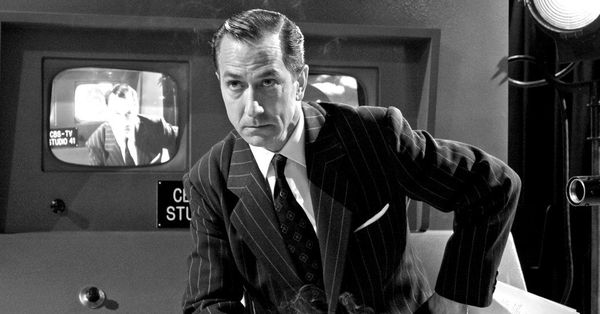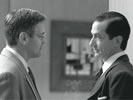Eye For Film >> Movies >> Good Night, And Good Luck (2005) Film Review

Halfway through Good Night, And Good Luck there is a scene that seems to take a detour from the main storyline. Television presenter Edward Murrow is engaged in a light and fluffy interview with Liberace, camper than Julian Clary at a girl scouts jamboree. Murrow asks the dainty piano tinkler if he will ever settle down with Mrs Right. Liberace waffles on about eventually finding the right person, without ever answering the question. Afterwards, being complemented on what a great interview it was, Murrow quickly fires a glance, nothing more, that shows a man disgusted with such a shallow use of the medium and of himself for perpetrating in it, which neatly summarises, not only Murrow's contempt, but also director George Cooney's, for then and now.
For his follow up to Confessions Of A Dangerous Mind, Clooney has reined in the wilder stylistic flourishes that nearly smothered an otherwise fine debut. Telling the story of the television crew, who spearheaded the stand against Senator Joe McCarthy's Communist witch-hunts, Good Night, And Good Luck is a small scaled, yet confident, smart and entertaining history lesson.

Clooney is a small part of the impressive cast, delegating himself to the supporting role of producer Fred Friendly, while he has given the starring role of Edward Murrow to David Strathairn, an actor who has never really been given the chance to shine in his many supporting roles, most impressive of which was that of Pierce Patchett, the smooth talking, high class pimp in LA Confidential. Here, he takes centre stage, yet never hogs the limelight. His Murrow gets angry and lets those near him know without having to raise his voice, or even open his mouth. Subtly he gets the audience on his side with his quietly considered reasoning and verbal sparring against the arrogant and bullying McCarthy, shown in archival footage.
The ensemble cast of recognisable and reliable actors, such as Jeff Daniels, Frank Langella, Robert Downey Jr and Patricia Clarkson, never hit a false note, but why the sub plot of Downey and Clarkson's clandestine marriage is given so much focus is a tad mystifying. More compelling is the story of fellow newsman and victim of the witch-hunt, Don Hallenbeck, played by Ray Wise - remember Laura Palmer's father in Twin Peaks? His performance of desperation and tragic shame gels perfectly with that of Strathairn's.
Clooney's script, co-authored with actor Grant Heslov, is brisk and zips along at a fast pace, while the black-and-white photography shines as bright as any Technicolor dream. Also, Clooney has a couple of neat directing flourishes and tricks up his sleeve, but, like the rest of the film and Murrow himself, keeps them subtle, never flashy.
While this is an Important Message Movie, it never beats the audience over the head, or lets it get in the way of the story. The comparisons that Clooney draws between shady government figures in the Fifties and today are subtle throughout. The film also echoes comments Murrow made himself, in a speech, about the responsibility broadcasters should offer to the public, instead of presiding over endless inane gossip and instantly forgettable entertainment.
In an age where the airwaves are dominated by tat, such as Big Brother, Celebrity Big Brother and Celebrity Love Island, news and documentaries about fixed elections and nations going to war on shady principles only seem to burn brightly for an instant before vanishing from the collective consciousness. Is anyone listening?
Reviewed on: 17 Feb 2006




















